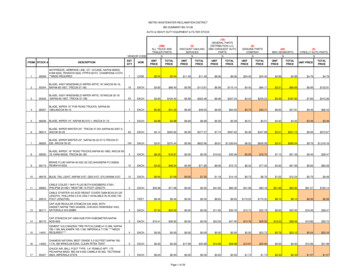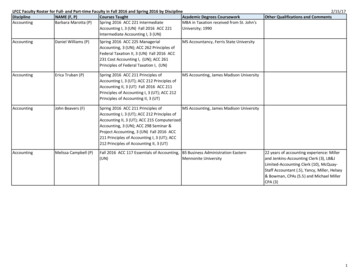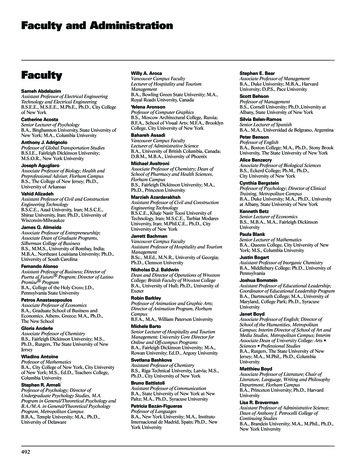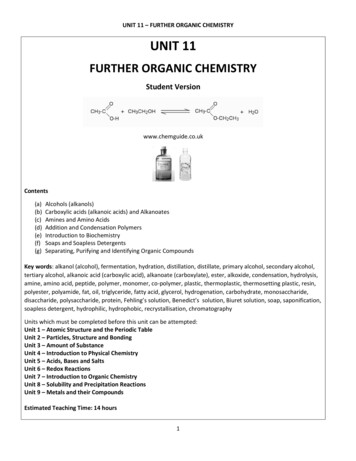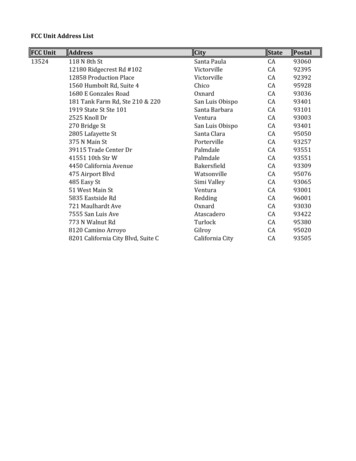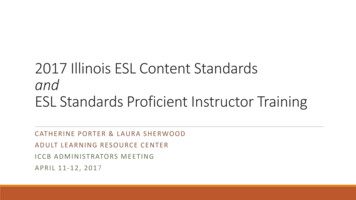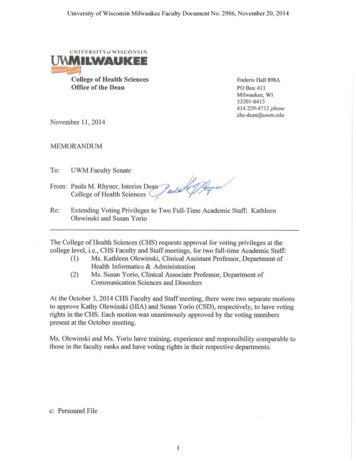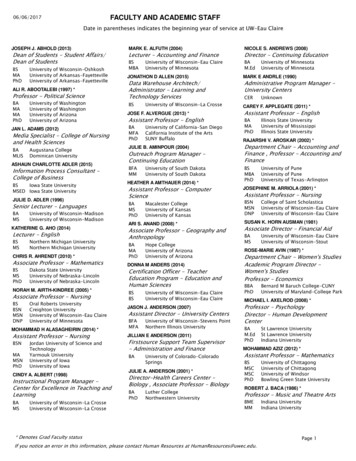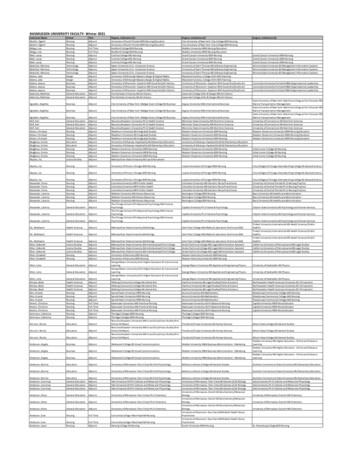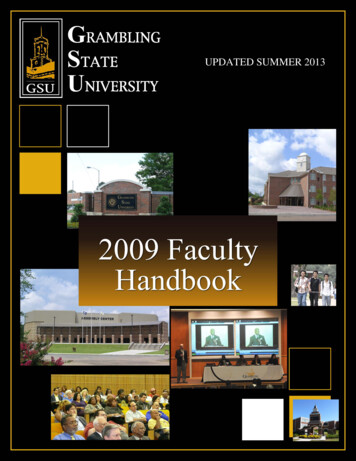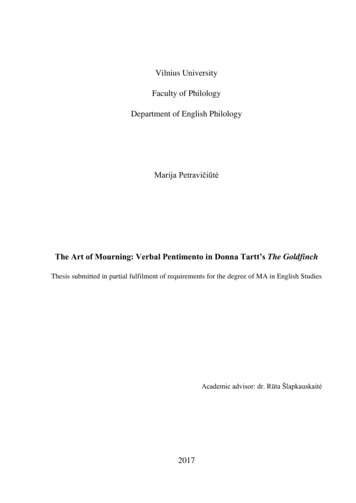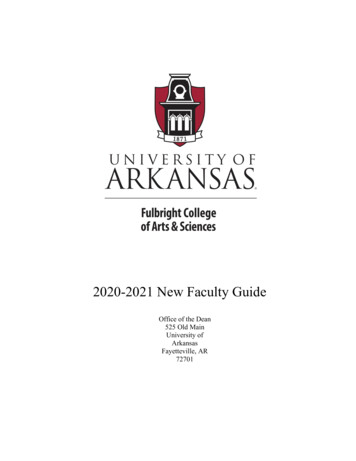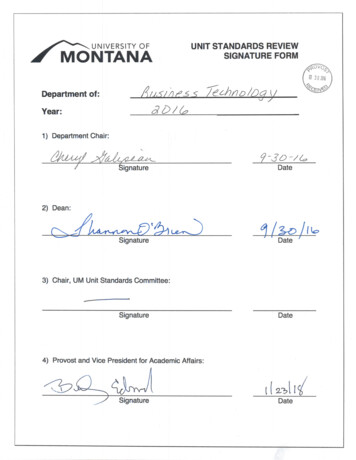
Transcription
Faculty Unit StandardsBusiness Technology DepartmentMissoula College-UMJanuary 2018I. IntroductionThe Department of Business Technology is guided by the standards and procedures set forth in the CollectiveBargaining Agreement (CBA) in regards to promotion, tenure, merit and salary decisions. These Unit Standards areintended to be in addition to, and consistent with those set forth in the CBA. All tenured/tenure-track faculty andnon-tenurable/adjunct faculty with teaching assignments greater than .5 FTE are covered by the CBA as well asthese Unit Standards. In order to support the Missoula College UM mission statement, faculty are expected tomaintain certain standards in order to be granted normal salary increases, merit awards, tenure, and promotion. It isthe responsibility of the individual faculty member to document completely all requirements and maintain anIndividual Performance Record (IPR) using the Faculty Evaluation Committee (FEC) established format.Every person covered by the CBA is at one and the same time (1) a teacher, (2) a member of the faculty of theUniversity, and (3) a scholar. By virtue of his/her position in the university, the individual shares all three of thesefunctions, each of which is of great importance. Although the responsibilities of the Business TechnologyDepartment fall under the same categories as those in every other University of Montana academic unit, theBusiness Technology Department places the greatest emphasis on teaching responsibilities in order to meet the twoyear education mission in Montana which is to “provide a comprehensive, accessible, responsive, student-centeredlearning environment that facilitates and supports the achievement of individual’s professional and personal goals,and enhances the development of Montana’s citizens, communities and economy”, and also meet the MissoulaCollege mission which strives “to create a comprehensive, accessible, student-centered learning environment thatfosters individual growth, facilitates workforce development, and provides a foundation for advanced academicachievement.”Academic responsibility is presented in detail in Section 6.2000 of the CBA. All faculty should be familiar withprofessional expectations, obligations, and responsibilities associated with their position within the department,college, and university.In the event of any omission or inconsistency with the department’s unit standards, the CBA will apply. These unitstandards, however, shall prevail when its provisions are more rigorous than those set forth in the CBA.II. DefinitionsIn order to provide clarification of terms used in the CBA, the Business Technology Department recognizes thefollowing definitions:a. Performance PeriodThe performance period consists of one or more years of record each running from October 16 toOctober 15.b. Terminal DegreeAs clarification of Section 10.110 of the CBA, a terminal degree for the Business Technology Departmentis defined as:Graduate degree in a discipline related to the mission of the department. These disciplines include,but are not limited to: education, business, accounting, law, medical information technology, healthsciences, culinary arts, computer science, information technology and related disciplines.
c.General Professional Qualifications for Rank and Appointment for BusinessTechnology FacultyFaculty rank is delineated in accordance with CBA Sections 9.000 and 10.110 defining minimum criteriafor academic faculty in the Business Technology Department. All full-time appointments are either nontenurable/adjunct, probationary, or tenure/tenure-track.1.2.3.Instructor: Master’s degree in an appropriate discipline; bachelor’s degree with two years ofdocumented outstanding professional experience; discipline specific associates degree and/orprofessional industry standard certification(s) according to the program’s national accreditingbody.Assistant Professor: Master’s degree in an appropriate discipline, plus nine (9) semester credithours of graduate level coursework in appropriate discipline; or discipline specific associatesdegree and professional industry standard certification(s) according to the program’s nationalaccrediting body.Associate Professor: Earned doctorate or other appropriate terminal degree; master’s degree inan appropriate discipline plus fifteen (15) semester credit hours of graduate work in a disciplineappropriate to area of responsibility; or bachelor’s degree, discipline specific associates degree,and professional industry standard certification(s) according to the program’s national accreditingbody.Candidates for this rank must have completed at least four years in the rank of assistant professorat the time of application. Candidates must have a demonstrated record of excellence in teachingand professional service, and have a record of scholarly activity (as identified above) as requiredin the Business Technology Unit Standards.4.Professor: Earned doctorate or appropriate terminal degree; a second master’s degree in adiscipline relevant to area of responsibility; or master’s degree with discipline specific associatesdegree, and professional industry standard certification(s) according to the program’s nationalaccrediting body.Candidates for this rank must have completed at least four years at the rank of associate professorat the time of application. Candidates must have a demonstrated record of excellence in teachingand professional service, and have a record of scholarly activity (as identified above) withsignificant impact beyond the university.Department chair appointments follow Section 16.210 of the CBA in which the dean consultswith department faculty and makes a recommendation to the provost.Adjunct faculty members who are employed on a non-tenured basis will be given a rankconsistent with the above criteria, with the modifier “Adjunct” preceding the title.d.Professional Qualifications for Culinary Arts and Related ProgramsThe following qualifications relate only to Culinary Arts faculty within the Business TechnologyDepartment. These qualifications are independent of the General Professional Qualifications for Rank andAppointment for Business Technology Faculty.A terminal degree is the basic expectation for new appointment to the faculty. However, employment maybe offered to an individual who does not possess a terminal degree. Before offering a faculty position toany individual, the department will determine if the candidate is qualified. This will be done by theMissoula College Dean in consultation with the Department Chair(s). Activities intended to developprofessional qualifications typically include advanced academic work, outside employment that results innew knowledge, application, or advanced specialization efforts. The mission of the Missoula College is tobe an institution of learning. The College does not take the concept of professional qualification lightly.Therefore, these qualifications are related to the specific teaching responsibilities of the faculty member.2 Page
The documentation required to support professional qualifications will vary with each individual,depending upon factors such as the organization in which the experience or education was acquired, thelevel of responsibility held in the organization, diversity of experience, and other factors. For this reason astandardized list of acceptable documentation will not be specified, however guidelines are recommendedin item (d) in Rank and Appointment. The FEC will provide each candidate with an IPR PreparationPacket that will guide him/her in the preparation of the required documentation. Prior to a consideration ofprofessional qualification by the College, the Dean and the Department Chair(s) will meet and determinewhat documentation will be required of the prospective candidate or faculty member. If suchdocumentation is required, a statement specifying the requirements will be communicated to the candidateor faculty member in writing so that the evidence may be returned prior to action. The following definesrank and appointment based on the American Culinary Federation (ACF):1. InstructorAmerican Culinary Federation (ACF)* certification or industry experience at the Certified Chef deCuisine (CCC) or Certified Secondary Chef Educator (CSCE) level and Associates Degree froman ACF Accredited Culinary Program or Hospitality and Tourism (HTR).i. CCC Culinary AA Degreeii. CSCE Culinary AA Degreeiii. American Lodging Association Certified Hospitality Educator (CHE) and ACFcertification or industry experience at the CCC or CSCE and Associates Degree from anACF Accredited Culinary Program. Associates Degree from an ACF AccreditedCulinary Program or Hospitality and Tourism (HTR).iv. CHE CCC or CSCE and AA Degree in Culinary or Hospitality and Tourism (HTR)2.Assistant ProfessorAmerican Culinary Federation (ACF) certification or industry experience at the CertifiedExecutive Chef (CEC) level and Associates Degree from an ACF Accredited Culinary Program.Or CCC and Certified Chef Educator (CCE) and minimum Associates Degree from an ACFAccredited Culinary Program or Hospitality and Tourism.i. CEC Culinary AA Degree or HTR AA Degreeii. CCC CCE Culinary or HTR AA Degreeiii. American Lodging Association Certified Hospitality Educator (CHE) and ACFcertification or industry experience at the Certified Executive Chef (CEC) and minimumAssociates Degree from an ACF Accredited Culinary Program or Hospitality andTourism.iv. CHE CEC Culinary or HTR AA Degree3.Associate ProfessorAmerican Culinary Federation (ACF) certification or industry experience at the CEC andCertified Chef Educator (CCE) level and minimum Associates Degree from an ACF AccreditedCulinary Program or HTR AA Degree and Bachelor’s Degree from an Accredited four-yearinstitution.i. CEC CCE Culinary or HTR AA Degree BAii. American Lodging Association Certified Hospitality Educator (CHE) and ACFcertification or industry experience at the Certified Executive Chef de Cuisine (CEC)and minimum Associates Degree from an ACF Accredited Culinary Program andBachelor’s Degree from an Accredited four-year institution.iii. CHE CEC Culinary or HTR AA Degree4.ProfessorAmerican Culinary Federation (ACF) certification or industry experience at the CertifiedExecutive Chef (CEC) and Certified Chef Educator (CCE) and Certified Chef Administrator(CCA) level. Or Certified Master Chef (CMC) and CCE. Minimum Associates Degree from anACF Accredited Culinary Program or Hospitality and Tourism and Master’s Degree from anAccredited four-year institution.i. CEC CCE CCA Culinary or HTR AA Degree MAii. CMC CCE MA3 Page
iii. American Lodging Association Certified Hospitality Educator (CHE) and ACFcertification or industry experience at the Certified Executive Chef (CEC) and minimumAssociates Degree from an ACF Accredited Culinary Program or Hospitality andTourism and Master’s Degree from an Accredited four-year institution.iv. CHE CEC Culinary or HTR AA Degree MA*All Certification levels equate to Pastry Chef levele.Evaluation FrequencyAll faculty will be evaluated in accordance with the schedule in Section 10.340 of the CBA.1. Tenured faculty members with the rank of professor will be reviewed every third year accordingto the alphabetic categories set forth in the CBA.2. Tenured faculty members with rank of associate professor will be evaluated every second yearusing the alphabetic categories set forth in the CBA.3. Tenure-track or tenured faculty members ranked as instructors and assistant professors areevaluated every year. Faculty members in their first year of service are not required to submit anIPR.4. All non-tenurable and adjunct faculty will be evaluated every year at the department level.5. Department chairs are evaluated as a faculty member according to rank under Section 10.000 ofthe CBA. Administrative performance is subject to review by the dean in accordance with Section16.240 of the CBA.f.Possible Responsibilities for Evaluating Professional PerformanceTeaching Faculty Field-based or off-campus enrichment and learning activitiesLaboratory design, preparation, supervision, and other associated responsibilitiesDevelopment of new courses, pathways, and programs of studyActivities related to program, college, or university growthCoordination, supervision, and evaluation of student projects, such as research orcompetitionsSupervision of independent study projectsDevelopment of innovative teaching materials or pedagogyActive and productive student advisingCollegiality with other facultyIntegrating new technology to improve course delivery and student successArranging field trips and/or guest speakers within the industrySupport collaborative partnerships with external and community organizationsPeer evaluations and peer mentorshipInstructional materials used by other facultyOpportunities for and participation in professional development activities aimed atimproving teachingActivities related to supervision of teaching/lab assistants/or student teachersVariety of teaching methodologies for varied learning styles to support student learningWriting recommendations for student tutoring, special needs, and/or developmental workBeing available to students during office hours or by appointmentActively participating in retention efforts at the departmental and college levelEvaluating library holdings, books and journals for classroom or laboratory useTeaching Faculty and Program Director Service 4 PageAll responsibilities outlined in Teaching Faculty Job Description (above)Responsible for supervising, planning, and coordinating the assigned program.Represents academic programs at orientation, early advising, and student-related recruitingactivities.
Assists in the researching, recommending, hiring, and evaluation of adjunct faculty.Assists the Department Chairperson in the preparation of class schedules includingscheduling and utilization of faculty.Assists in adjunct faculty orientation and mentoring.Assists adjunct faculty in all areas pertaining to their instructional assignments.Recommends members of program advisory committees to Department Chairperson; plansand conducts an advisory committee meeting at least once a year to review curriculum andprogram needs.Assists in the review of course revision, curriculum needs, and student retention.Prepares recommendations and submits to Department Chairperson.Assists in the preparation of documents for submission to ASCRC.Assists in the development, compilation, and organization of all materials necessary foraccreditation/approval and program or institutional evaluation.Assists with the assessment of student learning outcomes and program.Collects materials and forwards to the Department Chairperson.Initiates resolution of student and faculty requests, complaints, and petitions.When assigned by the Department Chairperson, develops a plan for the purchase,maintenance, and replacement of furnishings, tools, and equipment for the program.Plans internships with agencies. Submits agency contracts to the Department Chairperson ifappropriate.Represents program to the internal and external community; maintains active communitycontacts to assist in employment of program graduates.Assumes other duties as assigned by the Department Chairperson, Associate Dean, or Dean.Teaching Faculty and Program Director Governed by Accrediting Body Service All responsibilities outlined in Program Director Job Description (above)ACF Accreditation Self-Study Report (5 years) and Annual ReportAssists in the development, compilation, and organization of all materials necessary foraccreditation and program or institutional evaluationDepartment Chairperson – Department Academic Administrator Service and FacultyThe position of Department Chairperson in the Business Technology Department reports tothe Associate Dean of Academic Affairs. Department Chairs provide leadership incurriculum and in faculty development. They are ten-month personnel who serve asacademic administrators and maintain faculty status.Department Chairs assist in implementing faculty personnel policies and supervisecurriculum, courses, methods, and delivery of instruction in their departments. Chairsprovide supervisory leadership for full-time and part-time faculty and provide leadership inacademic program development, implementation, and assessment. Duties of the BusinessTechnology Chair include: 5 PageProvides leadership in all aspects of instruction within the Department and ensures thatrigorous instructional standards are maintained.Working with faculty and Program Directors: the Chairperson is responsible for theassessment of programs and student learning outcomes within the Department.Assists in supervising the development and implementation of academic courses andprograms and workforce needs.Evaluates full-time and adjunct faculty: Makes recommendations regarding reappointment,rank, merit, and promotion.Assists faculty in preparing professional improvement plans.Assists in the preparation of class schedules including utilization of faculty.Responsible for the staffing of part-time faculty within the department with assistance ofProgram Directors as needed.
Provides orientation for new part-time faculty with the assistance of Program Directors asneeded.Works closely with Retention Director and advisors to ensure student retention and success.Collaborates with the Office of Advising in implementing the processes and procedures ofstudent advising.Initiates part-time/adjunct faculty contracts.Assists in the preparation, review, and revision of college catalog with input from facultyand Program Directors within the Department.Arranges for the coverage of classes when departmental employees are absent.Assesses the need for and recommends the recruitment of new full-time faculty.Serves on search committees.Works with Program Directors and performs the responsibilities of the Program Director inthe absence of that individual.Collaborates with faculty and Program Directors to identify curriculum review and/orpropose changes to existing curriculum, and/or develop new courses and/or programs withinthe Department.Coordinates the ordering of course textbooks and other instructional materials and supplies.Reviews, coordinates, and recommends faculty requests for purchase of books, periodicals,audiovisual, technology, or other resources.Prepares annual and long term operating budgets.Prepares and submits regular reports consistent with the requirements of the Associate Deanof Academic Affairs, Dean, Provost's Office, and the President.Recommends work study students and temporary employees within the Department.Makes recommendations on course waivers, course substitutions, student overloads, audits,and course learning contracts with input from Program Directors.Assists in the resolution of student and faculty requests, complaints, and petitions consistentwith Department activities.Coordinates program reviews by working closely with Program Directors. Ensures thatprograms are relevant and current.Assists in the compilation of and analysis of academic reports and surveys and distributesresulting information to faculty as appropriate.Reviews and recommends faculty requests for professional development and/or other fundsand forwards to the appropriate office or committee.Assumes other duties as assigned by Associate Dean of Academic Affairs and/or Dean.III.Faculty Evaluation CommitteePurpose and MembersThe Faculty Evaluation Committee (FEC) provides peer evaluation and review of performance for each facultymember in the unit. Evaluation of faculty members should be seen as an opportunity to affirm the work of facultymembers evidenced by their professional activities and establish their qualifications for promotion, tenure, or merit.Qualification for service on the FEC occurs immediately following award of
American Lodging Association Certified Hospitality Educator (CHE) and ACF certification or industry experience at the Certified Executive Chef de Cuisine (CEC) and minimum Associates Degree from an ACF Accredited Culinary Program and Ba
